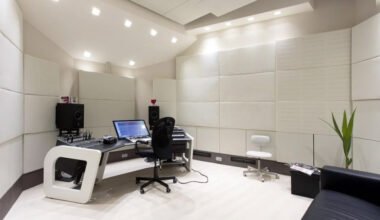Let’s face it—no one wants to come home on a hot day and find that their cooling system has gone on strike. It’s like the house decided to join a summer protest, and you’re the only one sweating through it. But here’s the thing: your system doesn’t just quit out of nowhere, notes TrueNest Property Management team. It gives you little warning signs—like a partner who’s been dropping hints, hoping you’ll notice.
Understanding what your unit is trying to tell you doesn’t require you to be a technician. You just need to pay attention to the small stuff before it becomes the big stuff. Think of this as your friendly guide to spotting the clues early, avoiding unexpected breakdowns, and saving your money (and your mood).
Common Noises from the Cooling System
Strange sounds can be one of the first signs that something is wrong. If you hear banging, rattling, or buzzing, your system is likely struggling. A loose part, a motor issue, or even a clogged filter could be the cause. These sounds may not mean an emergency, but they’re definitely a red flag. The longer you ignore them, the worse the problem may get. So, when things start getting noisy, it’s worth calling in a technician to check what’s up before the issue gets out of hand.
Recurring Repairs
It’s normal for systems to need occasional maintenance, especially after a few years. But if you find yourself calling a technician every few months for the same issues, it’s probably not just bad luck. Frequent breakdowns mean your system isn’t working as well as it used to, and it’s wearing down faster. When this happens, one of the biggest decisions you’ll face is whether to repair or replace AC. If your unit is over 10 years old, uses outdated refrigerants, or isn’t efficient, replacing might save you money in the long run. Repairs can add up quickly, and newer systems offer better performance and energy savings.
Higher Energy Bills
If your electricity bills have started creeping up without any change in how you use your system, it might not be a billing error. Older or poorly maintained units tend to use more energy to run. They may take longer to cool your space or work harder to keep up. This results in higher utility costs and more strain on your unit. Catching the issue early can prevent more expensive repairs or a surprise breakdown when you need it most.
Uneven Cooling Around the House
Are some rooms too hot while others feel like a walk-in freezer? That’s a sign that your system isn’t distributing air evenly. It could be a ductwork issue or a problem with the unit itself. Uneven airflow makes your home uncomfortable and often points to an aging or inefficient setup. A professional can check if it’s a quick fix or something more serious. Either way, it’s worth looking into before the temperature tug-of-war gets worse.
Frequent On and Off Cycles
If your system keeps turning on and off within short periods, that’s called short cycling. It usually means the system is struggling to maintain the set temperature. This could be due to a faulty thermostat, dirty filters, or low refrigerant levels. Besides being annoying, short cycling puts a lot of stress on your system, leading to faster wear and tear. It’s a good idea to have it inspected and fixed before it causes lasting damage—or drives up your energy costs even more.
Excess Humidity Indoors
Your cooling system isn’t just about temperature—it should also help control humidity. If your home feels damp, sticky, or muggy, even when the system runs, it’s a sign that something isn’t working right. Excess moisture can lead to mold, musty smells, and that uncomfortable, clammy feeling no one wants. The unit might be too small for your home or have trouble with drainage or airflow. Either way, humidity problems shouldn’t be ignored. Getting it checked out early can save your health, your furniture, and your mood.
The Importance of System Age
Every system has an expiration date. Most units last around 10 to 15 years, depending on how well they’re maintained. As your system gets older, it starts losing efficiency—even if it still technically works. You might not notice it at first, but over time, you’ll probably spend more on bills and repairs than the system is worth. If your unit is past its prime, it’s a good time to start thinking about your options. Planning ahead beats dealing with a breakdown in the middle of summer.
Dust and Allergies Getting Worse
Noticing more sneezing, coughing, or dust around the house lately? That could be your system’s fault. When filters get clogged, or parts start wearing out, your unit stops cleaning the air properly. Instead of filtering out dust, pollen, and other particles, they end up spreading through your home. This can make allergies worse and impact overall air quality. A quick inspection can tell you if it’s just a filter that needs changing or a sign of deeper system issues that need attention.
Declining Indoor Air Quality
Even if you’re not seeing visible dust, your air quality might still be slipping. Stale smells, increased humidity, or just a general lack of freshness indoors can mean your system isn’t circulating air as it should. When airflow is poor, or filters aren’t doing their job, your home won’t feel as clean or comfortable. Regular servicing helps, but if the problems continue, it could mean your system is no longer doing what it’s supposed to. Don’t wait until it becomes a health concern.
Outdated Refrigerant Use
If your system was installed before 2010, it might still use R-22 refrigerant, which has been phased out. This means repairs involving coolant are getting harder and more expensive. Plus, R-22 is harmful to the environment. Newer systems use safer, more efficient refrigerants. If you’ve had a recent service and were told your unit uses R-22, it’s a good idea to start looking into upgrades. Switching before your next repair becomes unaffordable—or unavailable altogether is better.
Your system doesn’t speak, but it definitely communicates. From weird noises to weird bills, it’s always dropping hints. Catching those signals early can save you money, headaches, and sweaty summer days. Don’t wait until things fall apart—call in a professional, do a system check, and make a smart choice for your home and comfort. Sometimes, the best fix is just paying attention.



